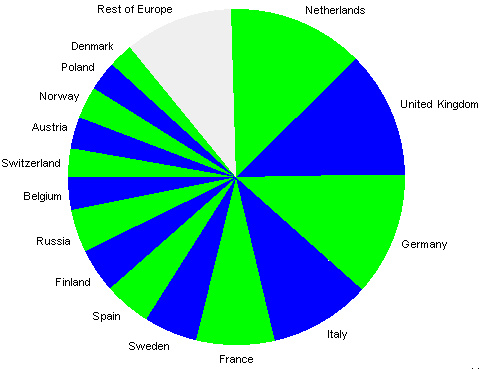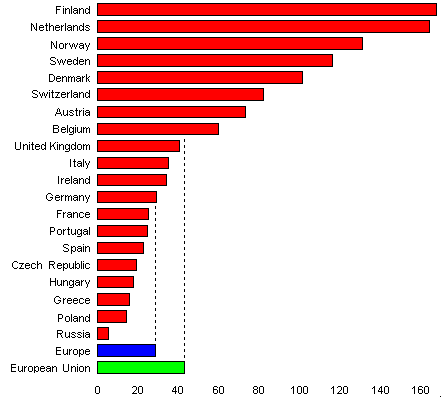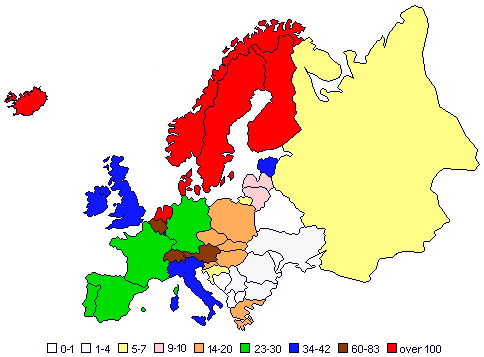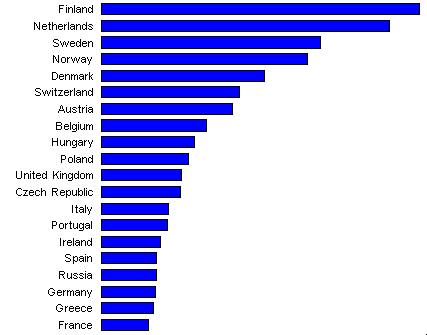No. 60 – November 26, 2001 |
Other articles on similar subjects
are published in English
in the monthly Offline column
|
 |
1. Editorial: The internet isn’t “newborn” |
|
|
Every now and then someone comes up with a new
“birthday” for the internet. Some say that we
should celebrate at this time, because the first
“chip”, or microprocessor, was commercially
available in November 1971. But that was not the
“birth” of the net. The invention of the microchip
was important for the evolution of personal computers, that
helped internet expansion, but PC structure had been defined
in 1968 and networking systems were in development since 1964
– based on concepts that had a much longer history. There was
a cultural evolution that would have almost inevitably led to
a communication system of this type, using a variety of
technologies that had been gradually developed in different
fields. So it’s difficult to set a precise date for the
beginning of the internet, though for several reasons it is
not unreasonable to say that it’s approximately thirty years
old (for instance the currently widespread system for e-mail
started in 1971).
In those thirty years there is a lot of interesting
history and of practical experience that is still very useful.
As I said two years ago,
this is not a case of nostalgia. But there are values and
experiences that it would be silly to forget.
Many today choose to pretend that it never happened. They
want us to believe that the internet was just born and should
be treated as an ignorant child. They want us all back to school,
to learn whatever ways and practices suit their particular interests
and inclinations. They want to re-invent the internet, and
indoctrinate its users, as they think is most convenient.
These self-appointed “new teachers” point to
the fact that until 1994 internet users were a relatively
small community of people that felt rather special because
they were online (but that doesn’t mean that it was an
élite – and, small as it was, it had considerable
cultural variety). Only in 1997 the use of the internet
became “popular” in the United States (and a year
later in most European countries). That’s true. But it
doesn’t mean that thirty years of experience are to be
ignored, or that “new” users are stupid and can’t
find their way around without the biased guidance of
“nannies” trying to direct them where is most
convenient for some commercial interest or cultural prejudice.
The people who want to send us back to kindergarten
believe that everything online should be subsidiary to a few
commercial interests. They want to centralize it so they can
dominate it. That isn’t good for anyone – not even in the
long run, for the people who are trying to gain control,
because the territories they dominate will dry up and become
deserts. It’s certainly not good for the rest of the world –
and if it doesn’t work for culture and society it doesn’t
work for business.
It would help people to understand the traditions of the
internet, learn from thirty years of experience. But even
newcomers that aren’t aware of the net’s history often
discover the values, find their way. People don’t need to be
led or “tutored”. They should be encouraged to
experiment and to develop their personal styles and inclinations.
Commercial activities are not the essence or the backbone
of the internet. The basic need is to encourage the free
development of human, social and cultural interchange, with
the greatest possible variety. To avoid centralization or
domination by anyone. And then to find the right place also
for commercial activities, which naturally exist in any human
environment.
People online (including newcomers) aren’t stupid. They
learn from those that were online before them – or find
spontaneously their own way. They discover and develop human
values, knowledge and dialogue. The basic realities on which
the net is founded and without which it has no reason to exist.
back to top
|
 |
2. Slower growth? |
|
|
Trends and developments will need to be reviewed in
coming months – but there seems to be slower growth of
internet use. For instance in Italy, after two years of fast
growth, the number of people online is increasing at a much
slower rate in 2001.
An article
by Kathy Foley published by Nua on November 12, 2001
reports that according to Oftel, the national telecommunications
regulator, only 39 percent of UK households were online in August,
compared with 40 percent in May. Of course one percent is not
a statistically relevant figure, but if there isn’t a drop
in the number of homes online there is stagnation, while everyone
was predicting fast growth.
The article points out that this is bad news for the
British government, which hopes to have every British citizen
using the internet by 2005, and is currently running a major
advertising campaign urging people to go online. In March of
this year, British Prime Minister Tony Blair said that by
2005, “It is likely the internet will be as ubiquitous
and as normal as electricity is today.” Not bloody
likely, mate, if the current state of affairs is anything to go by.
In all fairness to the British government, they are doing
their best to push up Internet penetration. According to a
report in the Daily Telegraph earlier this year, the
government is trying to ensure that all schools and libraries
in the UK will be online by 2002. It also plans to open 1,000
IT learning centers, and will lease computers to 100,000
disadvantaged families.
These measures should go some way towards bringing online
those who cannot afford the hardware, the increased telephone
bills, and the subscription fees necessary to go online at
home. In an earlier Oftel survey this year, 15 percent of
households said the reason they could not go online was that
they could not afford it. The same survey found that a third
of all households said they did not want or need home
internet access.
There are symptoms of stagnation also in the Untied
States.
A new study of US Internet penetration by Harris
Interactive was also released last week and it found that the
proportion of all adults online at home, at work, at school,
or at another location has remained virtually unchanged at
about 64 percent for the last 12 months. Internet penetration
has reached a plateau stateside and it is unlikely to grow
appreciably in the next few years. The other 36 percent of US
adults? At a guess, most of them just couldn’t be bothered.
Some people think that things could change with
broadband, but that is not a solution.
Unfortunately, the rollout of broadband in the UK has
been shambolic. At least 9 percent of US households have
high-speed Internet access but less than 1 percent of UK
households have such access.
Another report released last week, this time by the Oecd,
found that Britain came 22nd in a 30-country league table of
broadband penetration. Only 0.28 percent of British Internet
users have broadband net access, in comparison with the Oecd
average of 1.96 broadband connections per hundred people.
Even if broadband providers in the UK manage to extricate
themselves from the current mess of disorganization and bad
publicity, we must accept that there will always be those who
aren’t interested in using the internet, who just can’t be
bothered to go to all the trouble of going online.
Many people still seem to believe that broadband is a
miracle solution for all problems. It isn’t (see
The broadband disease).
For 99 percent of what people really want from the internet
broadband is useless – as it is useless to
“upgrade” to more expensive hardware or software.
Many uselessly “heavy” solutions aren’t just a
waste of time and money. They don’t work, they don’t provide
what people really want, they lead to inefficiency and disappointment.
It’s too soon to tell if we are really in a stagnation of
internet development and to try to explain why. But there are
probably four factors to be considered.
- A “temporary threshold”. All of
the people who two or three years ago were interested in
using the internet now are online – or have dropped out
because they didn’t find what they wanted. It’s a slower
process for other people, who are not as keen, to gradually
discover that maybe they have some reason to try.
- A negative mood in business. There is disappointment
and perplexity in many companies, large and small.
- A depressive effect of mainstream media. There has been,
and there continues to be, an exaggerated echo of the
failures of some large internet operations – which is, quite
wrongly, described as a general failure of the internet. A
misperception that leads to “wait and see” attitudes
or to cosmetic activities with a lack of real commitment. The
exaggerated hype on gee-whiz technical solutions or bizarre offers
that most people find uninteresting has an equally negative effect.
- Disappointment. Many promises are not kept, many online
services are inadequate. The more fantastic expectations are
generated, the more disappointing are the realities.
Above all – we need to understand that nothing has linear
or constant growth. Ups-and-downs are to be expected, it’s
quite natural for fast growth to be followed by adjustments
and slower developments. The exaggeration of problems and
promises generates confusion and disappointment. Only a more
practical, simple and human understanding of real values can
lead to solid and sound growth.
back to top
|
 |
3. New European data |
|
|
As said in previous issues – since November 2000 detailed
analyses of internet statistics are in the data
section of this site (now available also in English).
This is a summary of the most relevant information in the most recent
European data.
There are 15 countries in Europe with over 300,000
internet hosts, as we see in this graph.
Internet hosts in 15 European countries
Analysis on RIPE statistics – October 2001

The most relevant changes are the growth of the
Netherlands (though we can’t be totally sure that this is now
the country in Europe with the largest internet activity) and
a substantial increase in Russia (that a few months ago
reported 300,000 internet hosts and now has 800,000).
From the point of view of density (in proportion to
population) this is the situation in 20 European countries
with over 100,000 internet hosts.
Internet hosts per 1000 inhabitants
Analysis on RIPE statistics – October 2001

This is the density situation in Europe seen as a map.
Internet hosts per 1000 inhabitants

The next graph shows, for the same 20 countries, hostcount in relation to income.
Internet hosts in relation to income (GNP)
Analysis on RIPE statistics – October 2001

Some large countries, including Germany, France, Italy and Spain,
are relatively underdeveloped online in relation to the size of their economies.
Once again we notice a strong position, from this point of view, of some
Eastern European countries.
|
|